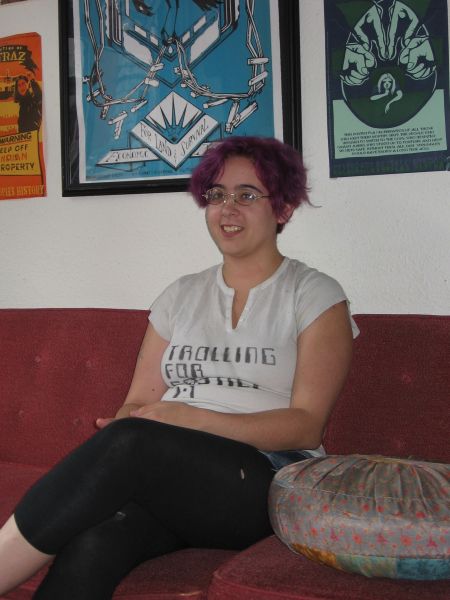Concordia University does not have its own sexual assault centre, nor does it have an exclusive and explicit policy addressing sexual assault. These two facts are little known to Concordia students but all too obvious to those who have been victims of such abuse.
“I think people tend to assume Concordia’s a really progressive institution and, so, we must have better policies and resources, and we don’t,” says Laura Ellyn. “We don’t.” Ellyn, a Concordia print media and women’s studies student, began heading up the Concordians for a Safer University Community campaign in April for a sexual assault centre on the Concordia campus. The campaign is being primarily orchestrated by the 2110 Centre for Gender Advocacy, a student-run group that promotes gender equality and empowerment.
The Centre wishes to expand the capacity of its current Mackay Street location to house a multi-dimensional sexual assault centre by the end of November. “I’d like to see it primarily be a place for survivor support work,” says Ellyn. A 24-hour crisis hotline, resource library, full-time trauma counselors and support groups are all destined elements of the proposed centre. They will serve to fill what Ellyn considers a serious void in survivor support at Concordia.
Currently, there does not exist a support network on campus geared specifically toward sexual assault victims, and the procedure for handling such cases is inconsistent across the university’s departments and bodies. For example, while health services follows a strict confidentiality policy, campus security forwards all reports to the police—whether the victim wants the police involved or not. Ellyn is particularly critical of this last method, which she says disrespects survivor autonomy.
Anaïs Van Vliet agrees: “Being supportive of someone is also allowing them to identify for themselves the kind of support that they want, and our job as allies and supporters is to support them (victims of sexual assault) through whatever avenue of support that they’re choosing, even if that’s choosing not to seek support at all.” Van Vliet is the external representative of the Sexual Assault Centre of the McGill Students’ Society (SACOMSS). It has served as a model for the 2110 Centre’s project in more ways than one.
SACOMSS grew out of the McGill Coalition Against Sexual Assault, which was formed in 1988 after a shocking gang rape at the Zeta Psi frat house alerted the student body to a prevailing problem of sexual assault on campus. The centre itself was founded in 1991 with the commitment to provide wide-ranging survivor support services, and to closely examine the way in which the university addresses the issue of sexual assault as a whole.
Van Vliet and Ellyn agree that universities are not breeding grounds for sexual assault in and of themselves. But in improperly dealing with—or avoiding addressing at all—the issue of sexual assault, large institutions like universities perpetuate this systemic societal problem and the myths associated with it.
“I think that prevention, for one, is often talked about in terms of the onus being on people not to get assaulted,” explains Van Vliet of universities inadequate approach to increasing awareness. “So, prevention is often viewed as a thing where it’s the responsibility of the targets; not the responsibility of people not to assault.” Such is seen on Concordia’s Security Department web site, which contains only four tips for protecting oneself from being sexually assaulted: one suggests to “avoid isolated and dimly lit areas” and the other three encourage safe drinking.
Concordia and McGill’s prevention strategies are also overly influenced by the gender binary. “I think the gender politics of sexual assault is often boiled down into a really simplistic understanding of survivors as always being women and perpetrators as always being men,” says Ellyn, before adding that while statistics show this is true the majority of the time, focusing too narrowly on this scenario ignores a significant percentage of victims. SACOMSS is one of the only sexual assault centres in Canada to offer services to transgendered individuals, transsexuals and those who don’t identify in the gender binary at all.
The 2110 Centre plans to do the same. It also wants to follow the lead of SACOMSS’ Outreach Branch in encouraging an open dialogue about sexuality, consent, sexual assault and the myths surrounding it. The 2110 Centre has been hosting movie nights this summer with several films focusing on the issue of sexual assault. Ellyn also has plans for a speakers’ series in September and orientation week workshops geared at student clubs looking to organize safer, more open events.
Ellyn hopes these actions will force the university administration to face its past (and current) negligence in “confronting rape culture” on campus. The campaign’s blog explains this reluctance to acknowledge the extent of the sexual assault problem on campus is particularly obvious in its minimal policy on the issue. What policy does exist uses euphemistic terms and, like that of McGill’s Policy on Harassment, Sexual Harassment and Discrimination Prohibited by Law, packages this form of abuse with several others.
“I think that there’s a sense that if it’s dealt with directly, then people might get the impression that there’s a problem at Concordia with sexual assault and people are really, really afraid of that,” says Ellyn. Pressure to improve Concordia’s policy and procedures regarding sexual assault is an integral component of the proposed centre, and an area in which SACOMSS has already seen success at McGill. It also offers support to students, staff and faculty in navigating the university’s policies and procedures, a service Ellyn aspires her centre to possess.
But first the centre must get off the ground. Ellyn’s campaigning has been met with a lot of support from the Concordia Student Union and the previous Dean of Students, Elizabeth Morey. Other members of the administration, notably campus security, have taken less kindly to the proposal. Ellyn says they do not perceive a problem with sexual assault on campus and, therefore, no need for a sexual assault centre. But in Van Vliet’s experience with SACOMSS, statistics should not play a role in a sexual assault centre’s existence: “The way that we feel about offering services is that if we’ve been open for one person to get the support that they needed, then we’ve done our job.”
To get involved with the 2110 Centre for Gender Advocacy’s campaign, contact Laura Ellyn by phone at 514-848-2424, ext. 7431 or by email at laura.centre2110@gmail.com.
The Sexual Assault Centre of the McGill’s Students Society can be found in the basement of the Shatner University Centre at 3480 McTavish Street, Room B27. They can be contacted at 514-398-8500.




